"An artist is someone who is brave enough to let the inner thoughts come out."
A conversation with artist Lindsay Gardner on creative process, illness, and figuring out what we want to make and how we want to feel.
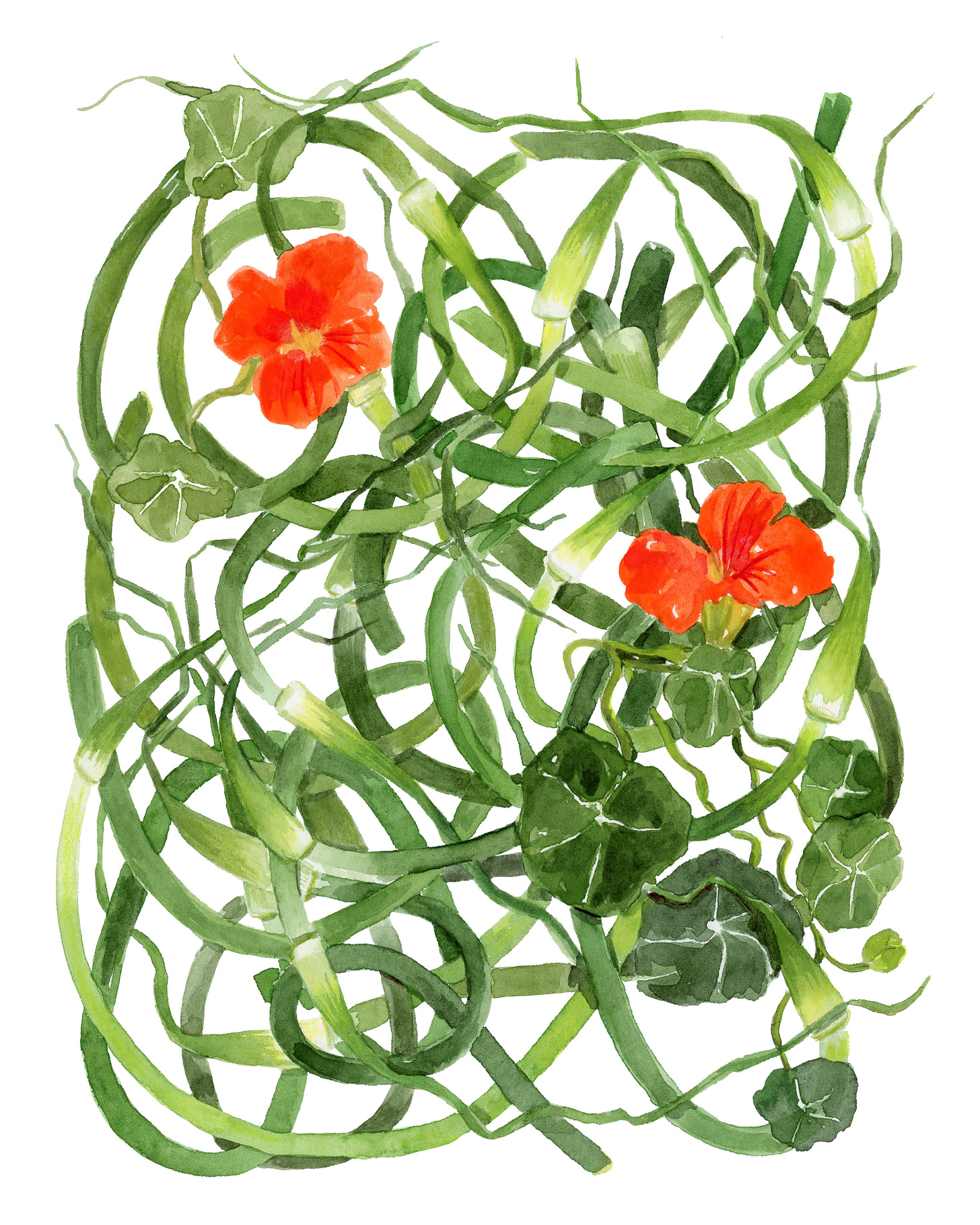
Creative Fuel is brought to life by paid subscribers. If you like getting this newsletter please consider becoming a paid subscriber. You help to keep the studio running and the coffee flowing!
Certain art speaks to you. Sometimes it’s hard to say why, but you know that when you see it, something clicks. The same can be said for words. When that something clicks, we can feel a connection to the person who created the work. Seeing or reading someone’s work may give us a hint at who they are, but I always remind myself that the story is always deeper, more complex, more nuanced. Which is why I love interviewing people whose work I connect with.
is a talented artist whose work I have enjoyed for a long time, both her visual work but also her newsletter . She is the author of the beautiful book Why We Cook: Women on Food, Identity, and Connection, and for the last few years has made a stunning calendar for Farm Club (here is a very fun look at the process behind that).This beautiful artwork is one side of the story. For the last two years, Lindsay has had an intense health journey, including being diagnosed with breast cancer. It’s so easy for all of us to focus on the bright, the flashy, the sensational, and in our long conversation I was reminded how this isn’t usually what we connect over. We feel a sense of kinship when we acknowledge our difficulties, when we don’t have to gloss over the truth.
As artists, it can so often feel like we are working in a silo, that what we do is simply sent out into the ether. Which is why we need conversations that provide us sustenance, remind us that we are not alone.
I hope that you too feel a sense of connection reading this conversation.
-Anna
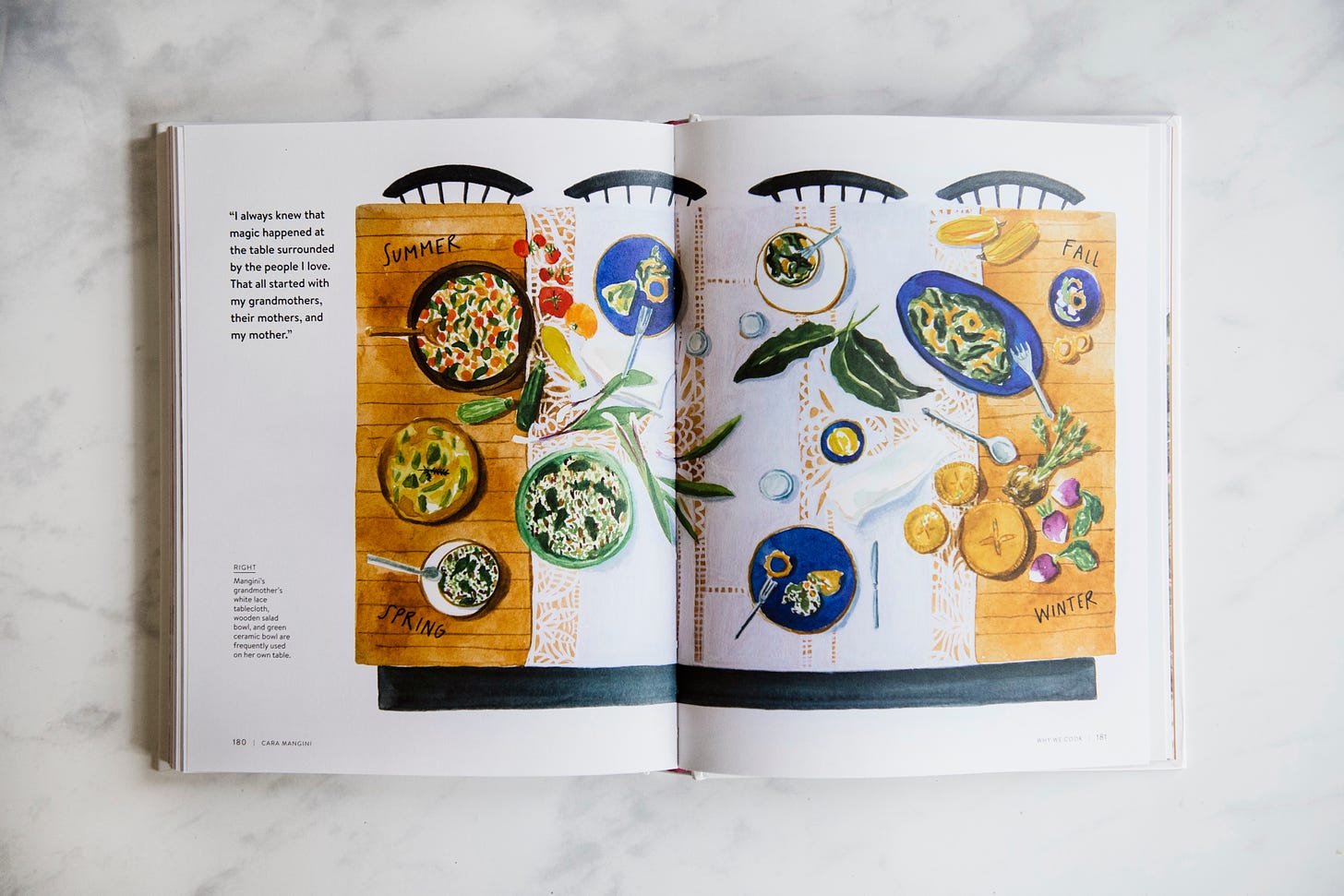
Anna Brones: Do you remember what you originally pitched for your book? How was the end result different than what you originally imagined?
Lindsay Gardner: That's a good question. It was similar but also very different. I started by inviting a list of participants who agreed to be part of it, and they wrote some sample copy that I included in the proposal. Some of it made it into the book and some of it didn't. I think I had a good sense of how I wanted it to include a real variety of kinds of content. What changed is the breadth of what it covered, in terms of the scope of how many people were in it in the end. When I first set out to do the book I did not imagine it being quite so big.
Are you working on any new books? And if not, do you want to work on another book?
I would love to work on another book at some point, but I'm not working on one right now. I mean, my life has been a little bit of a shitshow the last two years. A big shitshow actually.
Writing a book is such a massive undertaking and it totally consumes your life for a long time, and then you finish it. I remember getting asked all the time, “well, what's your next project?” And I just thought, “what are you talking about?” It was very nice that people were curious, obviously, but I had no idea what might come next.
When the book came out in spring 2021, my family and I were coming out of the pandemic and we had just moved across the country. We were getting our kids settled in a new school, we moved into a new house. All this crazy stuff happened at the same time, and then right as I was starting to get my feet under me and think about what was next, I got sick. I've been just dealing with health stuff for so long.
Now, it feels like everything is up for grabs.
When you say like everything is up for grabs, does that feel overwhelming or exciting?
I think in every category of my life, everything is both right now.
In the summer of 2022, I had an emergency liver crisis, which was super sudden and weird. I'm not a big drinker. It came out of nowhere. I was hospitalized for a week in the middle of the summer. It took me four months to recover and for my liver to start working correctly again. Then five months later, I was diagnosed with a super aggressive type of breast cancer. Last year I started treatment in April—seven months of chemo and immunotherapy and then had a double mastectomy in October. I'm still in treatment now—I get immunotherapy every three weeks. I have three more treatments until I am done at the end of June, then I have another surgery in the fall. By then it will basically be two years solid of health stuff crises.
It has been totally life changing. I feel much better now and I'm feeling a lot stronger than I did even two months ago. There are days when things feel completely overwhelming and then there are days when everything is possible, like I've been given another chance.
Through the last two years I really lowered my expectations for myself, just to get through the day. I would say that before this last couple of years, I was a bit of a perfectionist. But I was just talking to my therapist about this, because I said, “so the good thing about lowering expectations is that it takes the pressure off, but when do you know when you've lowered the expectations too much?”
What was the therapist’s response?
She laughed. She just said, “you'll know.” I think it's true that to be able to access anything, you have to lower your expectations enough to be able to find a way in that does not feel so high stakes. Through all these health experiences, my priorities have shifted, and they continue to shift. Three months ago, I thought, “all I want to be able to do tomorrow is go for a walk and make dinner for my family.” That would have checked every box of my day because it was so much more than I was able to do six months earlier. Now, as I feel better and stronger, I have higher expectations for myself. It’s a very shifty thing.
I'm trying to figure it out, because to be honest, I don't want to go back to everything that I was doing. This is a very long way of saying: it's a little bit of both right now.
It's overwhelming sometimes because there's so much I want to do, and I feel totally invigorated to get back into to my life. I want to make exactly what I want to make and nothing else. Then there are days when I'm exhausted and I have to get in bed or nothing goes well, or I get to my studio and I just don't have any energy. I don’t feel as dependable as I used to feel, at least yet. I will at some point.
Hearing you put words to those feelings makes me think of how we’ve had a similar journey as a society, post COVID. For those years everything just stopped, we shifted how we lived, and then things opened back up, and we all just started sprinting and then thought, “I feel tired and depressed and anxious. Why??” It feels like with what's going on globally and domestically, we are often in that space when one day everything feels possible, and the next day, everything is horrific.
Yeah, I think there are some of similarities. I was already feeling some of that with moving during the pandemic, and then coming out of it like everyone else did and reevaluating every part of our life. There is something happening right now in all of this where I'm very much in the middle, and still in transition. I feel super awake to the sense that this is my one life. I have to do what I want to do with it.
The hard thing about that is that I feel that in every part of my life. I want to cook all the things and I want to travel and I want to spend quality time with my husband and I want to be a super duper mom with my kids, and have connected, tight-knit relationships with them. I just want to totally come back into myself. That makes me feel a little overwhelmed sometimes. I have to do that without making it feel like pressure and stress. It's a really fine line, right? It is for anyone.
How do you be the fullest version of yourself without turning it into a total manic pressure cooker?
Yeah, and I think in this day and age there are many things that exacerbate that pressure cooker and put it on overdrive immediately. You really have to be conscious about building that scaffolding for yourself. Because if you don't, it just derails so quickly.
Totally. Back when I was writing the book, my husband had a super intense job and was gone for 12 hours a day. I was managing our two small kids. We were working on a project in our house, so I was putting on my noise cancelling headphones while there was a guy knocking a wall down in my little office, writing the book and making calls to about 50 people a day. It was just insane. Maybe it's just getting older, maybe it's having been sick with lots of time to think, but I am not interested in working or living that way again.
So that begs the question, how do I want to work? What do I want it to look like? What are the creative endeavors that I truly want to pour my heart into right now? Who do I want to give my time away to? That's also another big question that I'm thinking about.
That visual of you sitting with your noise cancelling headphones, and the people working around you, and then calling a bunch of people—my immediate thought is that we never see that on the outside, unless somebody is very intentional about sharing it. In general, when we come to a book or we come to a piece of art, we do not see the behind the scenes part, we only see a little bit. I sometimes wonder if we saw more of that process, would we think about this stuff differently? But it also makes me think about how in the creative world, we have that myth of struggle, that good work comes out of sacrifice and pressure. I think it’s easy to feel like if I'm not struggling, if I'm just having fun and it's joyful, and it just takes up the right amount of space, can I then be proud of it?
I think about that all the time. One, I think a lot about how my best work comes from a place that isn't hard. It doesn't have to be hard to be good. I have to keep telling myself that, because I think there's this weird mental hurdle that we make for ourselves: “I'm going to make it so hard and if I can do that, then I know I'm really good.” It just doesn't have to be that way. Perhaps that's a cultural thing that we have inherited.
I agree there's this very one-dimensional part of ourselves that gets shown to the world. One practice that's been helpful with that for me is writing, because it's a place that I can be honest and thorough. There isn't necessarily the same kind of format for that in visual art unless you make a real point of being showing “here's my sketch and here's the shitty part of the process, and here's when it started to get better.” I don't have the time or energy to spend explaining that whole process to someone else. But in writing, it's a different thing. I don't know who's reading it, but it's healthy for me.
I think it's hard sometimes for us to just let go and have it be fun, and not have to make it hard. I think I'm a multitasker by nature. Maybe that's because I'm a woman or because I have kids, who knows, but I definitely have a lot of things going on in my life and I can't, or I won't, just say, “well screw that, I'm just going to do this.” Obviously this is a conversation women artists have been having for a long time.
I don't have kids and I think there are a lot of things about being childfree that we don't talk about publicly. One of those things for me is that I feel a lot of pressure for things to be hard because I'm not a mom. There is a fear of coming off as a self-indulgent, childfree lady who’s just living it up. That pops up all the time and I see myself leaning into making things hard as some kind of justification for making a choice that society thinks is weird.
It’s like you have a really cranky nun sitting on your shoulder!
That's hilarious.
I do the opposite, but similar thing where I feel like because I have kids, I make things hard to prove to myself that I'm like a real artist. Whatever that means. I think we all do things like that to ourselves for some reason.
Probably the patriarchy.
When in doubt, I think that's a good answer.
In thinking about the last few years, what are some of the things that you are really thinking about in a deep way, after coming through that journey?
My background is in painting. I went to San Francisco Art Institute for my MFA. Making art was something that was always my thing, but I never thought that I would do it professionally in my life. I thought, “oh, it's nice that I have that hobby, but I'm never going to really make that a thing.” Then I went to graduate school for painting and still, even then I didn't see myself in that world. I have no regrets about grad school. It was a really great learning experience, but I never felt like I totally fit in there. By the end was burned out and thought “I don't even want to be an artist, even as a hobby.”
It wasn't until I had our daughter, and I was home with her for the first year, that I started drawing again, while she was taking naps. That led me to drawing a lot and then I took an illustration class with Lisa Congdon which led me down the road to freelance work. For a long time that really sustained me—I enjoyed how collaborative illustration can be and I liked feeling like my art and my creative process could help someone solve problems. It was empowering to be able to make part of a living from that work.
When I started working on the idea for the book, that was sort of a turning point. I started to feel curious about what it would be like not to just work for other people. I was curious about being the source of my own projects.
Now I think I'm in this place where I really, really miss the phase of my life before graduate school when I was just painting and I was making what I felt like making. It was so exciting and everything felt possible. I want to do more of that. I want that feeling more in my life. For a long time I think I pushed that part of myself away. Now, through this experience the last couple of years when my health and my whole life was in peril, I’ve started coming back to the idea that maybe that's where I need to put my energy: allowing myself to really be the source of what I'm making.
I think this is hard for anybody who has art as part of their work: if you have incorporated your creativity into your profession in any way, shape, or form, it's really hard to hold on to that joyful potential because it is just hammered out.
Yeah. I think it requires very intentional “life editing” and I think that is also another big part of what's happened to me over the last couple of years. I feel clear about what I don't want to work on and what I do want to work on. I want to be choosier now, and I feel that I must be choosier now. That might not be a great financial decision, but that’s ok.
Being an artist is probably not a great financial decision. So you're already on that path [laughs].
True! I think about my kids a lot in this whole big picture as well. I want to show them that it is possible to live a life without compromising what you want to do. I’ve actually started renting a studio this year for the first time in a really long time, with six other artists. It's wonderful and luxurious to have a place that's just mine. When I go there, I don't get distracted by everything else. Being able to focus on all of these big ideas when I’m there feels great.
Two questions I always ask: what makes someone creative and what makes someone an artist?
I've been reading
. I recently read the one about drawing in the margins. I have thought a lot about that concept of creative multiplicity. My creative self comes out in all parts of me like cooking and reading, and all kinds of crafty stuff with my kids. It’s a mindset I am proud that is part of me.But there's a difference between someone who is creative and someone who's an artist. An artist is someone who is brave enough to let the inner thoughts come out.
I've been thinking about that a lot with writing, because there are all these things that I notice all the time and I might make a mental note of, but for a long time, I would let them just pass by. So you have your nun, and I have an imaginary big older brother on my shoulder saying, “that's a dumb idea.” So I am constantly talking myself out of what could be, convincing myself that my way of seeing is trite or unoriginal. I want to start talking myself into those things instead.
Most of the artists I admire the most, living or dead, are the ones who've let their weird inner thoughts and observations come out. I feel like I'm starting to see that coming out in my writing and I aspire to do that in my painting too.
It’s so easy to say and so hard to put into practice isn’t it? That becomes a life's work: pushing that stuff to the side, at least for a bit so that you can lean into it. But it requires some pretty serious intention on a daily basis to make that happen.
Yes, and I feel like I'm ready for that. I'm at the point that if I don't start doing it now, then I’ll start questioning why bother. That's the whole thing, right?
I've been reading quite a bit about Alex Katz lately because just prior to my cancer diagnosis, my husband and I went to see Katz’s huge retrospective at the Guggenheim, and it was just this unbelievable experience. I've been trying to figure out exactly why it felt so important to me. In one of the essays about him in the exhibition catalog, he wrote that the essence of his creative endeavor was to try to capture the passing moment, which is related to the thing that I was just talking about. He wrote, “Eternity exists in minutes of absolute awareness. Painting, when successful, seems to be a synthetic reflection of this condition.”
THAT is the thing, and I think that's why he's still painting as a 96-year-old man.
I do think that is a life's work.
It also makes me think of your point earlier about being at this place where there's lots of potential: the moment holds the eternity because it is so full and potent. That’s the thing about being an artist, you're often like, “oh my God everything is potent.” For me, in the moments when I'm more invested in my creative process, I'm just more awake. Everything feels a lot more just connected and vibrant, which I think is maybe an antidote to how we feel as a society.
I think that's true. It takes intention and it takes momentum. You have to have consistency every day to do that and stay in that place. It’s really hard to be in that mode and then go away from it for two weeks and come back to it. When I read about the artists that have been able to achieve that—like some of my heroes like Alex Katz or Lois Dodd—they just go out and do it every single day no matter what. That takes such determination and commitment. Mary Oliver did the same thing or Joan Didion, who was just writing down things all the time. It’s a mindset that that's the way that you're going to live. It’s something I aspire to.
Yeah, for sure. It’s like creative blocks: you can kind of just get on with it through doing. We’re just wrapped up in this overthinking and if you can have an intention to do it regardless of what the nun or older brother on your shoulder is saying, then through the doing you work through that.
And really, like a lot of things in life, you make your own curiosity, right? Nobody is going to come in and give you a great idea. Even if it’s “I'm curious about what this brushstroke could be.” Whatever small thing it is, there's validity in those inquiries that we have, and then the crucial thing is to act on them. When I think of some of my favorite paintings—like Lois Dodd, for example—she was looking so closely at things right around her. They were just everyday, normal things. There's so much beauty right around us, it doesn't have to be spectacular, or singular, like you're the only person that ever saw a beautiful sunset. When you put that weight on it, it just makes it harder, or so hard that you don’t do it.
Yeah. You would never say, “well somebody painted a flower once, I guess I can't do that.”
Exactly!
When you say it out loud, it sounds so silly and yet we have that voice at play, like all the time.
Absolutely.
says “drawing is looking and looking is loving.” I think about that all the time. Isn’t that exactly what art making is, just paying attention to something? I think artists are attuned to notice those things. It's just whether we spend time and energy doing something with what we're noticing.Through this very intense health process, did you have any art practice that you came to?
I wouldn't call it a practice per se, but around when I got sick with that liver problem, I was having a really hard time sleeping and eventually when I woke up in the middle of the night I started writing poetry.
And then during cancer treatment this same impulse came out of my intense anxiety, and the very real experience of wondering, “am I dying right now?” I would wake up with words in my head. For a long time, I just let them be there. And then one night I just decided to write them in my phone. I remember talking to my therapist about that. I said, “yeah, but I'm not really writing poetry. I mean, real writers of poetry don't write poems on their phone in the middle of the night.” She kindly replied, “what are you talking about? It doesn't matter where you write something down, it's still a thing that comes from you.”
I kept writing poetry through that whole time of being sick. I have a ton of poems that are just sitting in notes on my phone. I don't know if I'm scared to share them with the world, some of them are really dark. But I think that they’re an accurate representation of what was happening to me. It was the darkest moment of my life, that was very real. I haven't quite gotten brave enough to share all of those things with other people yet, but I’d like to.
I look back at the writings and poems and I know exactly what I was thinking about when I wrote them. I didn't think about it as a practice then. I just thought, “this is happening. Maybe I want to remember the day that my hair all fell out. Or the time I was rushed to the emergency room. I'm going to write two sentences about it.” It was minimal, but I was doing it. Now that I'm not in the intense phase of treatment and I have a more consistent writing practice, I see the relationship to what I started then.
It’s the reminder that we never really know what we're doing and what something is building to. If we only did things knowing what we were building to, it wouldn't be the same. It wouldn’t maybe be as genuine.
Yeah, yeah, absolutely.
I feel really open right now. Going through cancer treatment is so utterly humbling. It makes it very clear that this is it—this very moment.
I know exactly how I want to feel in my creative practice. I am just tinkering with how to make that happen—what that looks like and feels like, and continuing to try to believe that I have a source inside of me that is not going to dry up or go away. I'm trying hard to know that those annoying naysayer voices are always going to be with me, but I'm trying to beef up the other encouraging voices too.
I feel like, “what do I have to lose at this point?”
I like what you said, “I know what I want to feel in my creative practice.” Coming at it from that perspective is very different than, “I know what I want to make.” “What is it I want to feel and how do I facilitate that?” is a very different starting point.
Yeah. I always try to think about that in terms of music. It’s easy to tell in music when that total connection is happening for someone, because it's their literal voice pouring from their body and soul. That's how I want to feel.
Thank you Lindsay!
Check out more Creative Fuel interviews here.
In our interview, Lindsay voiced that she hadn’t really shared any of her poetry publicly. I asked if she wanted to do so here and she said yes!
RESOURCES + INSPIRATION
Lindsay shared some of the things she’s listening, reading, and paying attention to these days.
Listening:
Iron and Wine's new album, Light Verse
Reading:
This is Happiness by Naill Williams
The Postcard by Anne Berest
Steve Martin on Peter Schjeldahl in The New Yorker
Alexandra Schwartz' profile of Miranda July in The New Yorker
Calvin Tompkins The Lives Of Artists collection
Looking closely:
Four Lois Dodd paintings from the Alexandre gallery: Windows and Reflections, 2016, Recent Paintings: Winter and Summer, 2006, Small Paintings, 2004, Day and Night, 2016
Latest cookbook acquisition:
Health Nut by Jess Damuck (do not miss the chocolate covered tahini dates!)
Upcoming Creative Fuel Workshops + Events
Our next Create+Engage workshop is July 10th from 5-6:30pm PT. Click here to register and see who the guest artist is!
DIVE, the Creative Fuel Collective writing group facilitated by is going to be back for another cohort this fall. Just imagine all the things you’ll want to write about after summer. More info + tickets here.
Do you enjoy Creative Fuel? You can support this work by becoming a paid subscriber. You can also order something in my shop, attend one of my workshops or retreats, or buy one of my books. Or simply share this newsletter with a friend!





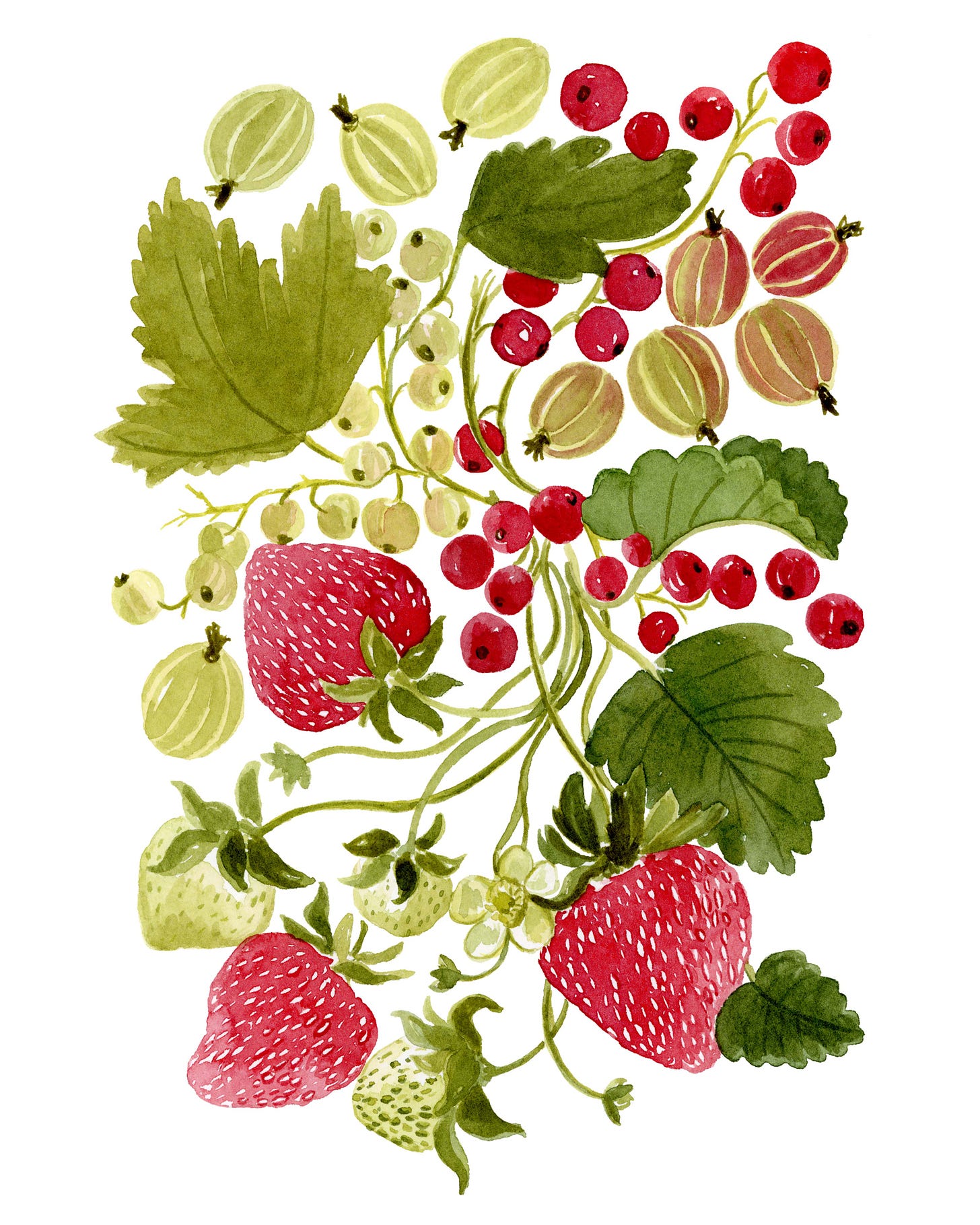
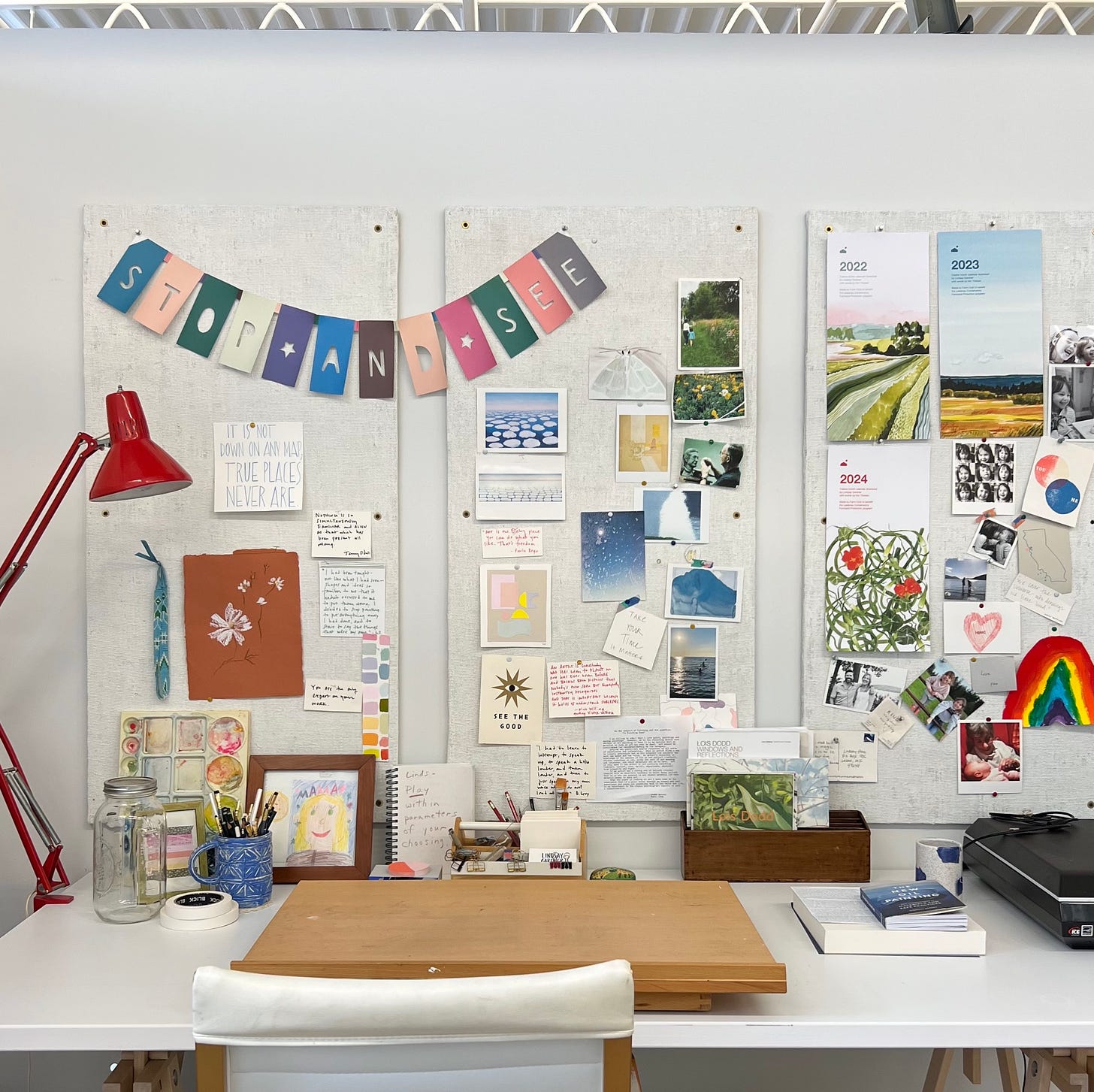
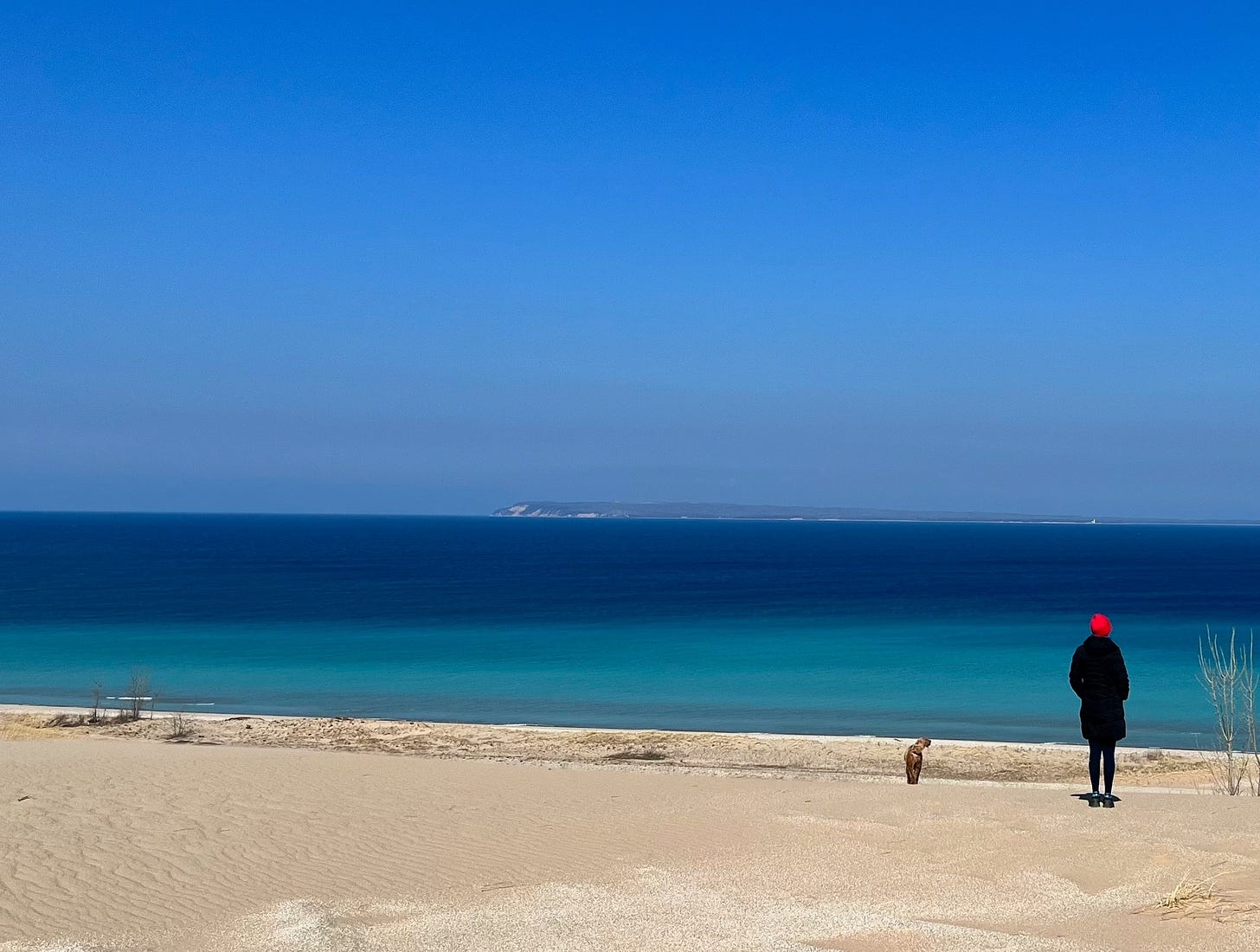
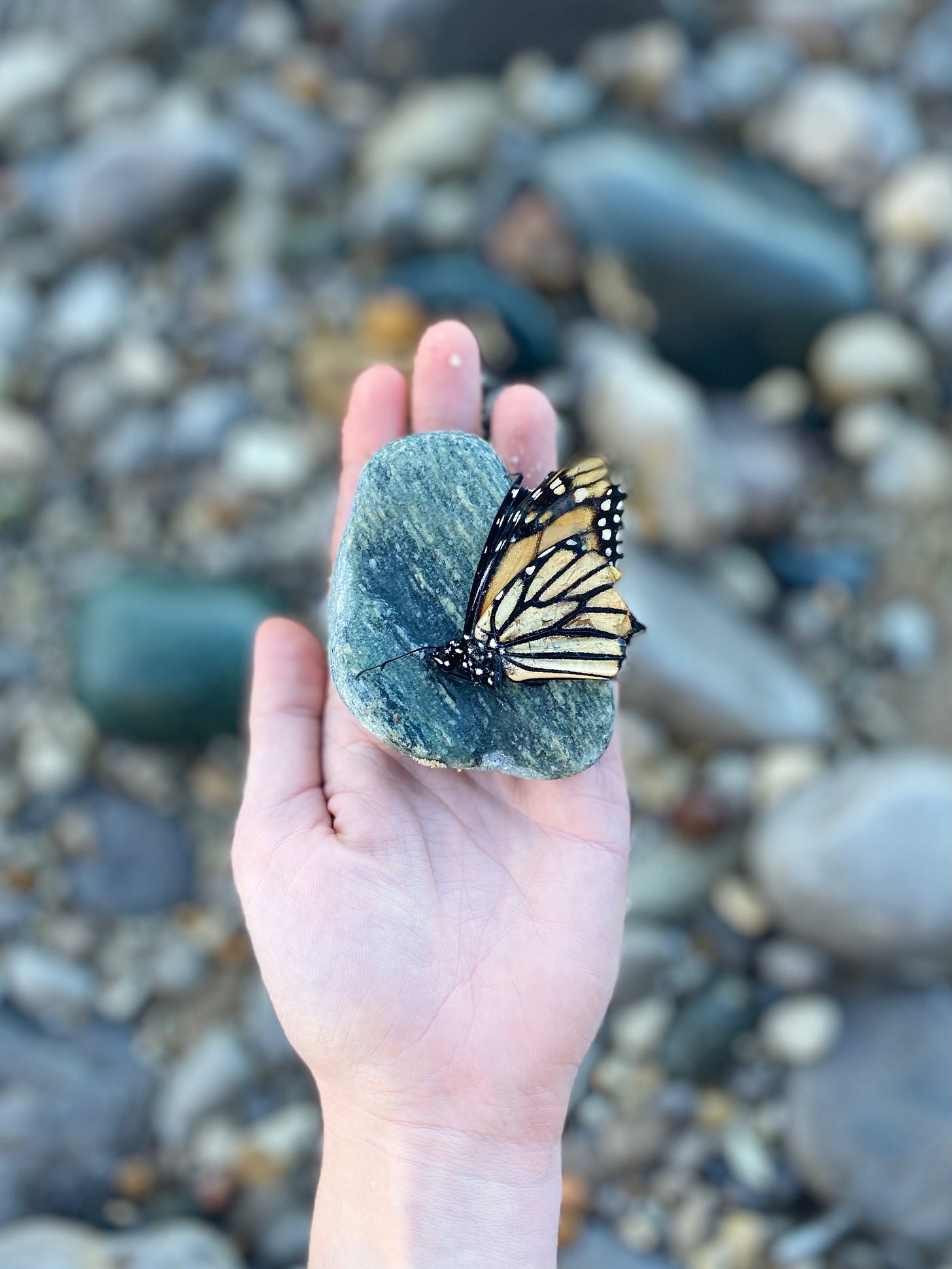
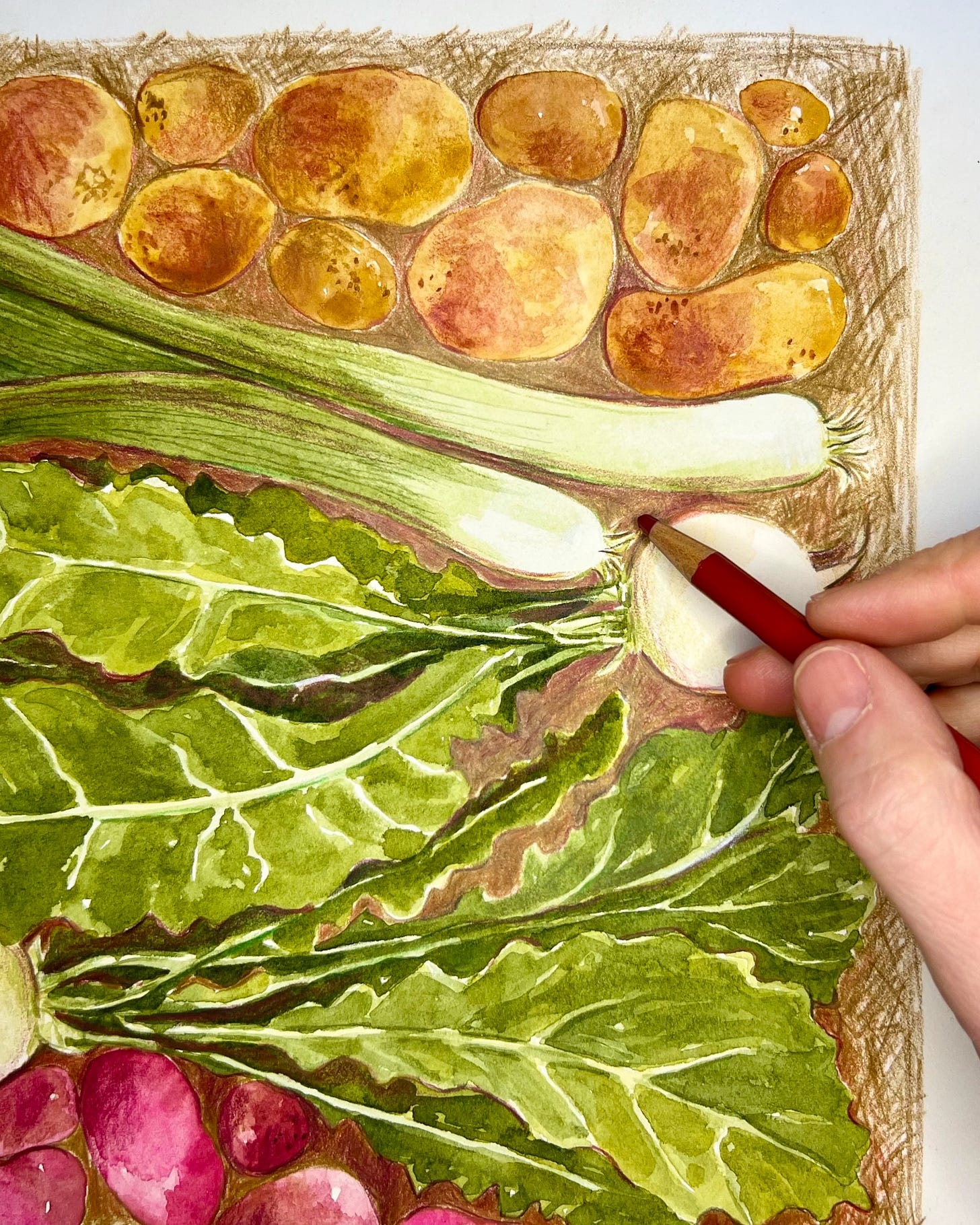
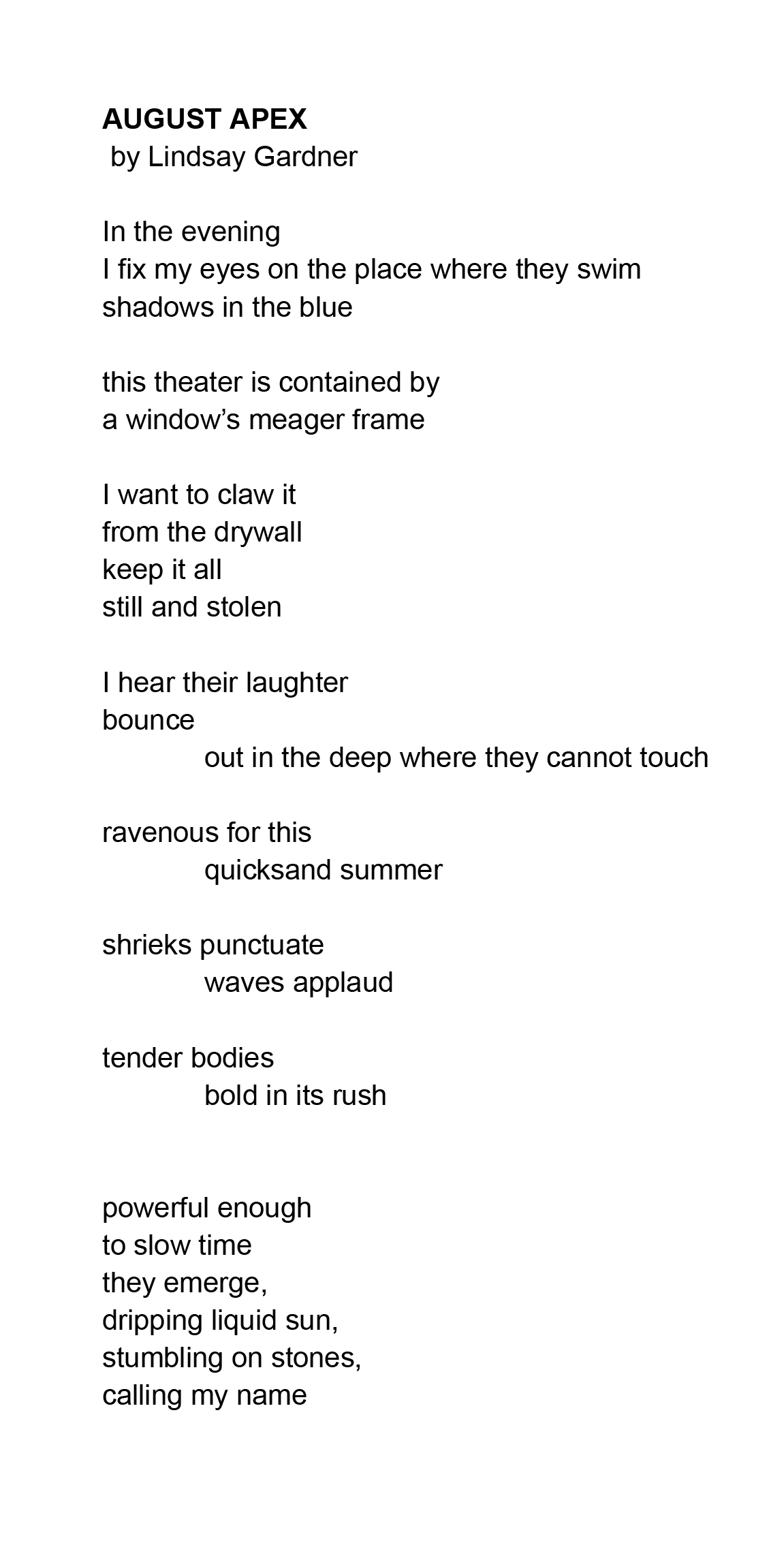

This was such a treat to read. I got so much from this conversation. Thank you both for your candid sharing.
Thank you for inviting me to be part of your interview series Anna. I continue to reference our conversation - so much good stuff!